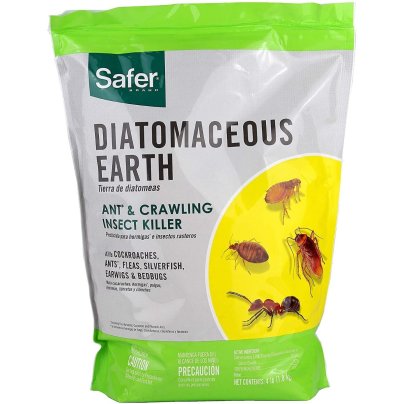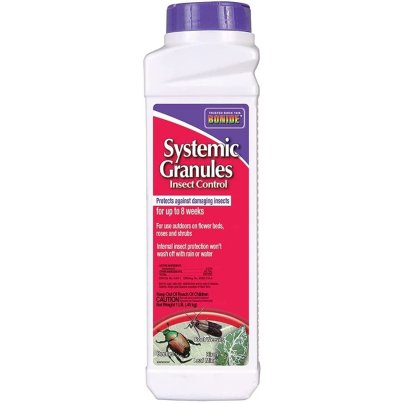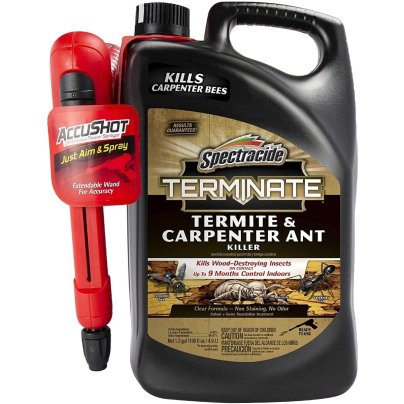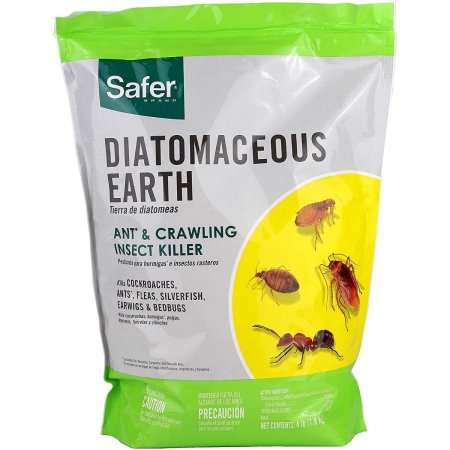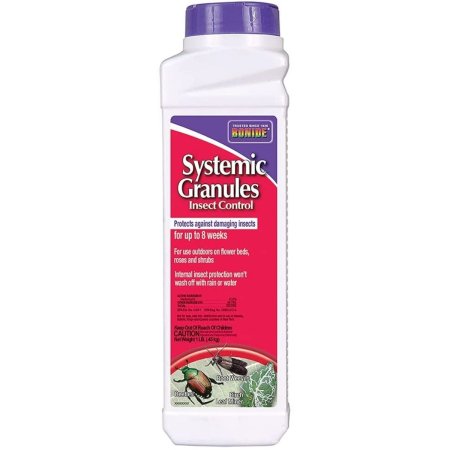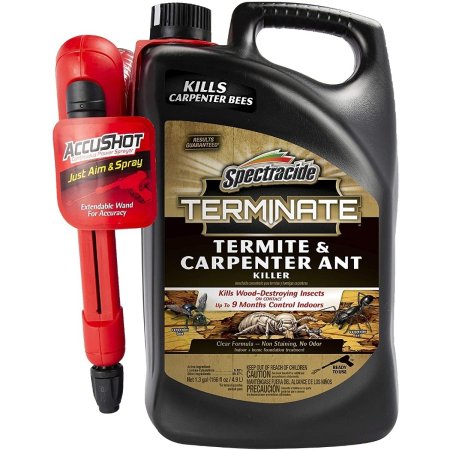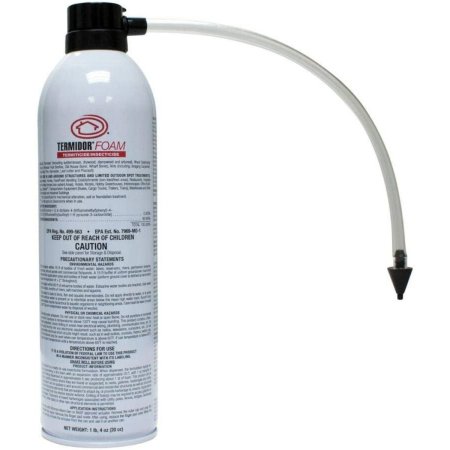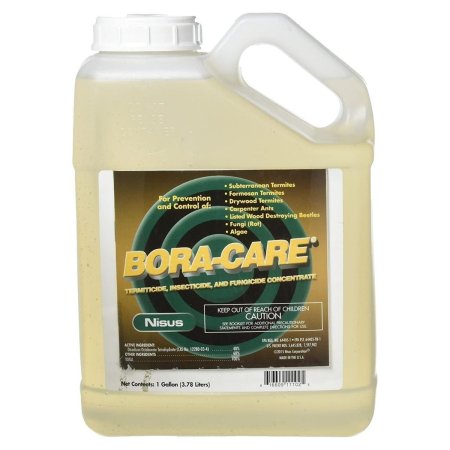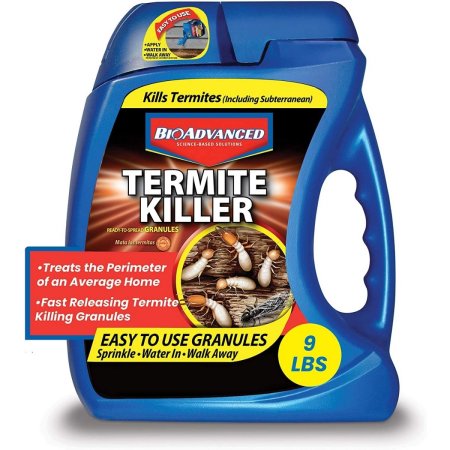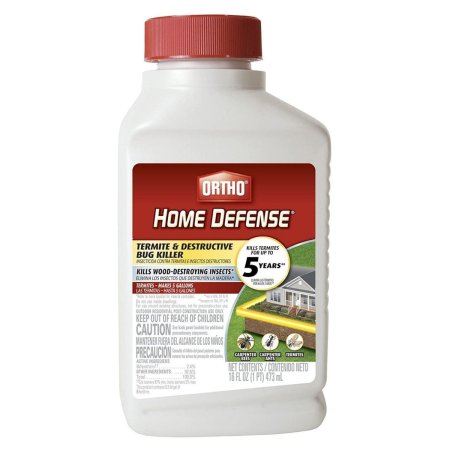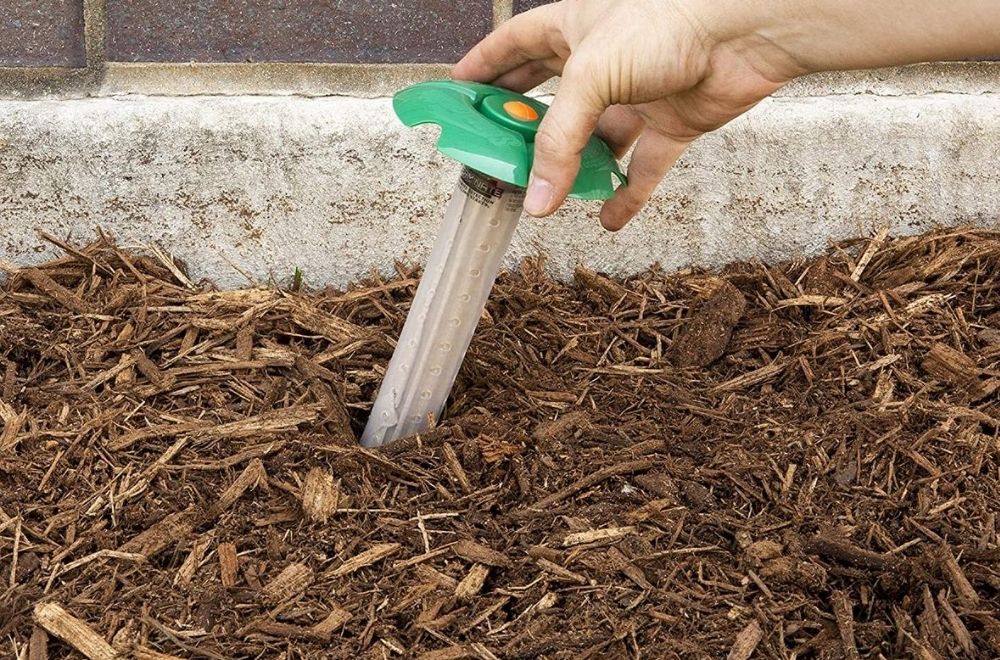
We may earn revenue from the products available on this page and participate in affiliate programs. Learn More ›
Termites are elusive pests that can quickly form colonies in a home before showing significant signs of infestation. Since termites feed primarily on wood and wood products, a colony in a home can cause a lot of damage in a little bit of time. Common signs of termites include discolored drywall, peeling paint, hollow-sounding wood, and pinpoint holes in drywall.
If a colony is left untreated long enough, the walls may begin to crumble. However, you can eliminate and prevent termites from reentering with the best termite treatment. We researched top-rated termite treatments in a variety of categories, focusing on customer satisfaction, product efficacy, and value. We examined the leading options on the market, comparing the features—and, equally important, customer reviews—to come up with our list of favorites.
- BEST OVERALL: Safer Brand Ant and Insect Diatomaceous Earth Powder
- RUNNER-UP: Bonide Systemic Granules Inspect Control
- BEST BANG FOR THE BUCK: Spectracide Terminate Termite & Carpenter Ant Killer
- BEST FOAM: BASF Termidor Foam Termiticide
- BEST BAIT: Spectracide Terminate Detection & Killing Stakes
- BEST WOOD TREATMENT: Nisus Bora-Care Termiticide, Insecticide & Fungicide
- BEST FOR SOIL: BioAdvanced Termite Killer Granules
- ALSO CONSIDER: Ortho Home Defense Termite & Destructive Bug Killer
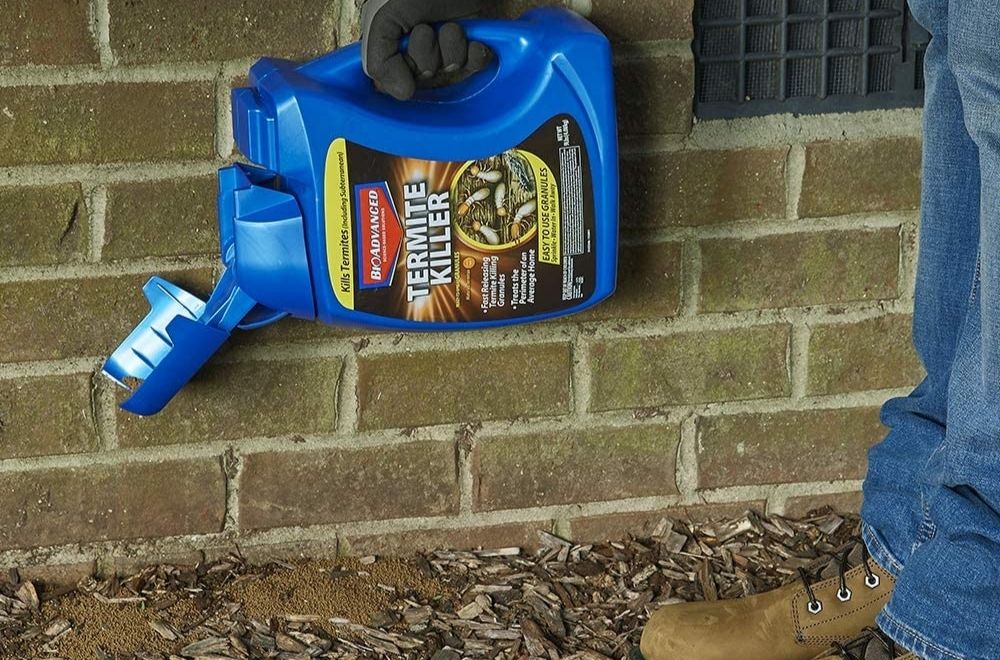
Before You Buy Termite Treatment
Termite infestations can grow quickly, requiring a termite treatment to rid a home completely of these annoying pests. However, if the home has not yet been infested, people can take these steps to help prevent termites:
- Inspect the foundation each season for signs of termites. These insects create mud tubes to protect themselves from the sun. Mud tubes appear like lines of mud leading up the foundation and into the siding. Keep an eye out for termite droppings, which indicate an infestation.
- Proper ventilation and sealing reduce the moisture buildup in a home that termites love. Ensure all windows, doors, and vents are properly sealed and schedule yearly maintenance for attic ventilation systems, if necessary.
- Keep wood piles away from the house and trim vegetation that is creeping too closely. Termites are drawn to these sources of food and can easily follow the trail to any wood details on the house and then the wood frame inside the walls.
- Use pressure-treated wood for all outdoor construction projects. Termites are rarely interested in wood that has been combined with chemicals.
If these preventive measures don’t keep the termites away, it might be necessary to take steps with a DIY termite treatment or even consider calling in professional pest control services, though the termiticides pros use are far more powerful and could require people and pets to vacate the home temporarily.
How We Chose the Best Termite Treatments
Killing current pests or preventing termite infestation can protect a home from disastrous consequences in the long run. When selecting products for this guide, we researched the available choices and picked the top options based upon ease of use, effectiveness, ingredients, and longevity.
These picks are all proven to be effective at deterring termites and other pests with strong active ingredients like imidacloprid, fipronil, lambda-cyhalothrin, and hexaflumuron. Each ingredient is made to effectively kill termites, ants, roaches, fleas, or more common pets for all-around protection in a home or outdoor space. Plus, many of the above picks are meant to last for weeks or months after just one application.
We selected products that are also easy to use as they can either be sprinkled, sprayed, or set up within minutes. Be advised that some of these treatments may require watering or monitoring to remain effective and some also may not be safe for vegetable gardens or homes with pets.
Our Top Picks
We’ve gathered some of the best termite treatments for home use in specific categories. Check out these reliable pest control solutions below to find the best treatment for your home.
Best Overall
Safer Brand Ant and Insect Diatomaceous Earth Powder
Pros
- The active ingredient—diatomaceous earth—is natural and eco-friendly
- Works quickly, killing termites in just 48 hours
- Since this product is free of synthetic chemicals, it’s safe for use in homes with pets and children
Cons
- The formula may need to be applied more than once to be effective
Product Specs
- Type: Natural insecticide powder
- Key ingredient(s): Diatomaceous earth/silicon dioxide
- Also good for: Ants, cockroaches, bed bugs, fleas, earwigs, silverfish, millipedes, and centipedes
For those looking to end their termite problem without introducing harmful chemicals to the environment, diatomaceous earth is a solid option. This natural substance consists of the fossilized remains of microscopic aquatic organisms; it infiltrates the exoskeletons of termites, dehydrating them from the inside out and killing them within 48 hours.
Diatomaceous earth is also an effective means of killing ants, bed bugs, cockroaches, fleas, and other insects. This product is not harmful to humans or pets, providing the ideal pest control solution for homes with animals and young children.
Get the Safer Brand termite treatment at Amazon, Ace Hardware, The Home Depot, or Tractor Supply Co.
Best Budget
Bonide Systemic Granules Insect Control
Pros
- More affordable than many other comparable termite treatments
- In addition to killing pests, the granules also act as a fungicide
- This formula is designed to be effective for up to 8 weeks
Cons
- Not safe for use on vegetable gardens as it can be toxic to humans
- The active ingredient may be harmful to hummingbirds and bees
Product Specs
- Type: Insecticide granules
- Key ingredient(s): Imidacloprid
- Also good for: Gnats, mealybugs, aphids, and whiteflies
An excellent option for use behind appliances, under furniture, or around the perimeter of a home, this affordable insecticide comes in a granular form that can be sprinkled around a problem area to create a barrier against invading insects. However, this is not the type of insecticide to use on fruits or vegetables, as it can have a toxic effect on humans if the plants are eaten, and it can also be toxic to pollinators like bees.
When using this product on grass or other plants, the granules must be watered into the soil. The insecticide is then absorbed through the roots, protecting them for up to 8 weeks. This insecticide’s active ingredient, imidacloprid, kills gnats, mealybugs, aphids, whiteflies, and termites and also acts as a fungicide to help keep houseplants protected.
Get the Bonide termite treatment at Amazon (1 pound) or The Home Depot (4 pounds).
Best Value
Spectracide Terminate Termite & Carpenter Ant Killer
Pros
- Affordable formula provides impressive longevity, lasting for up to 9 months
- Treatment is safe for both indoor and outdoor use
- The built-in spray nozzle makes for easy application
Cons
- People and pets should avoid the treated area until the product has dried
Product Specs
- Type: Liquid concentrate
- Key ingredient(s): Lambda-cyhalothrin
- Also good for: Spiders, roaches, carpenter ants, carpenter bees, fleas, and ticks
Termites and carpenter ants can do significant structural damage to a home by either eating or nesting in its wood framing. This ant and termite killer from Spectracide is designed to take out both types of insects on contact. It features a gun-shaped applicator with a high-pressure spray that can treat areas around the home’s foundation where carpenter ants and termites reside.
When applied to the foundation, this termite and carpenter ant killer stays present for up to 9 months and prevents future infestations. It’s also suitable for use around baseboards, closets, and outdoors around decks and wood fences. In addition to ants and termites, this formula eliminates spiders, roaches, fleas, and ticks.
Get the Spectracide termite treatment at Amazon, The Home Depot, or Tractor Supply Co.
Best Foam
BASF Termidor Foam Termiticide
Pros
- Comes with a spray hose for simple application
- Termites bring the product back to their colony for more effective results
- The active ingredient, fipronil, kills termites within 24 hours
Cons
- Since it contains an insecticide, pets and children should not be permitted to be unsupervised around the product
Product Specs
- Type: Foam termiticide
- Key ingredient(s): Fipronil
- Also good for: Carpenter ants, stink bugs, carpenter bees, and more
DIYers can spray BASF Termidor foam termiticide behind baseboards, into termite holes, and other difficult-to-access areas of a home using the narrow spray hose. The foam takes only 5 seconds to expand, with 1 ounce quickly becoming 1 quart of foam. This expansion fills gaps and forces the foam deeper into the termite tracks.
The nonrepellent formula is almost undetectable to termites, so they inadvertently make contact with it, ingest it, and share it in the nest. The active ingredient, fipronil, binds to a termite’s nerve endings, disrupting the central nervous system and killing them within 24 hours. BASF Termidor foam termiticide also works to treat carpenter ants, stink bugs, carpenter bees, and many other pests.
Get the BASF termite treatment at Amazon.
Best Bait
Spectracide Terminate Detection & Killing Stakes
Pros
- 15 units are included, so it’s possible to encircle an entire home with bait traps
- Stakes are easy to monitor due to the the pop-up indicator that’s included
- A digging tool is included to make the installation process easier
Cons
- Doesn’t produce instant results and takes days to months to be effective
Product Specs
- Type: Bait stakes
- Key ingredient(s): Hexaflumuron
- Also good for: Termites only
Spectracide Terminate Detection & Killing stakes are easy to install around the perimeter of a home using 10-foot spacing between stakes. The bait trap sinks into the ground where it is accessible to subterranean termites. Once the termites begin to take the bait, an indicator will be released on the top of the trap to show that the elimination of the nest has started.
The bait traps use the active ingredient hexaflumuron to destroy the reproductive abilities and maturation cycle of pests. The downsides with this method are that it can take a few days to a few months to see any progress against termites and there is a need to monitor the bait regularly and replace the stakes at least once yearly to ensure ongoing protection.
Get the Spectracide termite treatment at Amazon, Ace Hardware, Lowe’s, or The Home Depot.
Best Wood Treatment
Nisus Bora-Care Termiticide, Insecticide, & Fungicide
Pros
- Formula is derived from natural ingredients and doesn’t contain potentially harmful chemicals
- Long-lasting formula can remain effective for decades
- Safe to use both indoors and outdoors around the house
Cons
- Sold at a higher price than other termite treatments
Product Specs
- Type: Wood treatment
- Key ingredient(s): Disodium octaborate tetrahydrate
- Also good for: Wood-infesting beetles, carpenter ants, and decay fungi
Mix the Bora-Care at a 1:1 dilution with water and grab a sprayer, brush, or roller to apply to new or existing wooden materials. The active ingredient in this natural termite killer, disodium octaborate tetrahydrate, is a borate compound that disrupts the enzyme production and digestive systems of the termite, ultimately causing death.
This termite control treatment kills any existing infestation in the wood and can last as effective protection against recurring infestations for decades. The wood treatment can kill all species of termites, wood-infesting beetles, carpenter ants, and decay fungi and can be used on both interior and exterior structures.
Get the Nisus termite treatment at Amazon.
Best for Soil
BioAdvanced Termite Killer Granules
Pros
- Ideal for users who don’t want to use termite treatments inside their homes
- The treatment provides protection for 6 months
- 1 container treats up to 200 linear feet of soil
Cons
- Active ingredient, imidacloprid, is toxic to bees and wasps
- The full effects of this product take up to a month
Product Specs
- Type: Insecticide powder/granules
- Key ingredient(s): Imidacloprid
- Also good for: Termites only
BioAdvanced termite killer granules is a powdered substance that DIYers can sprinkle around their home’s perimeter. After applying the powder to the soil, water the powder so it can seep into the soil. The treatment acts within a month to kill existing nests and can protect a home for up to 6 months.
The active ingredient in this BioAdvanced termite killer, imidacloprid, works in a way similar to fipronil, killing insects by disrupting communication in their central nervous system, but it is less toxic to humans and pets. It is, however, toxic to bees and wasps. Unfortunately, due to the method of activation, this termite treatment can only be used outside, but it is an excellent option for perimeter defense in the yard.
Get the BioAdvanced termite treatment at Amazon, Ace Hardware, or The Home Depot.
Also Consider
Ortho Home Defense Termite & Destructive Bug Killer
Pros
- When the concentrated liquid mixes with water, it creates 5 gallons of treatment
- It offers versatility in terms of application method, working as a surface spray or soil treatment
- This termite treatment continues to work for up to 5 years
Cons
- This treatment is not safe for vegetable gardens and could be harmful to some aquatic wildlife if it makes its way into waterways
Product Specs
- Type: Liquid
- Key ingredient(s): Bifenthrin
- Also good for: Termites, carpenter ants, and carpenter bees
Ortho Home Defense termite and destructive bug killer can be mixed with water to create 5 gallons of termite treatment that can treat up to 37.5 linear feet. This solution, when applied in a trench around the perimeter of a home, can kill existing pests and repel future infestations for up to 5 years. The solution also works as a surface spray on wooden surfaces, wood piles, tree stumps, and more to treat existing infestations, although its effectiveness as a surface spray does not last as long as when it’s applied in a trench.
The active ingredient, bifenthrin, is a pyrethroid, which is designed to mimic the toxic effects of naturally occurring pyrethrins by destroying the termite’s central nervous system. This termite treatment can kill termites and treat carpenter ants, carpenter bees, and other wood-destroying pests.
Get the Ortho termite killer at Tractor Supply Co.
Or, DIY Your Own Termite Treatment
DIY termite treatments using household ingredients may not be as effective as professional treatments or commercial products. However, it is possible to make a DIY termite treatment using household ingredients.
Dish soap and water can be an affordable and effective solution for treating termites. To make a termite treatment using dish soap and water, mix 1 tablespoon of dish soap with 1 gallon of warm water. Stir well and pour the solution into a spray bottle. Locate the area of termite activity and spray the solution directly onto the affected area. Repeat this process multiple times over the course of a few days. The dish soap prevents the termites from breathing, eventually killing them.
It’s important to note that this method is typically effective for minor termite infestations and may not be as effective for larger infestations. If there is a severe termite infestation, it’s best to consult with a professional pest control company for effective treatment options.
Jump to Our Top Picks
Types of Termite Treatments
Treating a termite infestation can be as easy as setting traps or as involved as digging a trench around the home to set up a termiticide barrier. The four main types of termite treatments include liquid-soil termiticides, termite baits, building materials with termiticides, and wood treatments.
Liquid-Soil Termiticides
Liquid-soil termiticides are a long-lasting treatment that can keep a home safe from termites for up to 5 years on average, though some products claim a longer protection period.
However, this treatment isn’t simple. It requires digging a trench around the home and applying the liquid treatment to it, making sure that there are no gaps in this chemical barrier before filling the trench. Termites can find gaps in the barrier and could enter, so it is suggested to have a yearly termite inspection just to be certain.
An easier method of applying a liquid-soil treatment is with a sprayer. The treatment doesn’t last as long when applied without a trench, but the concentrated spray termiticide is easy for most DIYers to use. It forms a chemical barrier in the soil surrounding the home.
Termite Baits
Fighting a termite infestation with termite baits requires strategically placing bait stations around the home for the termites to find. A bait includes powerful active ingredients, like hexaflumuron, that kill the termites slowly. Foraging termites will take the readily available bait back to their nest, infecting the other termites in the colony.
This method is effective for destroying an infestation but could take a month or more before acting on the termites. Termite baits also need regular monitoring and maintenance to ensure that the bait stations still have bait.
Termiticide Building Materials
A great way to prevent termite infestations in new construction is to treat the building materials with termiticides before beginning construction. Lumber can be treated with a spray or a brushed-on concentrated solution. An alternative is to apply termiticides anywhere the new structure touches the ground to pretreat the soil.
Using building materials that are repellent to termites, like pressure-treated wood for building a deck, is helpful for preventing termites. Or choose naturally resistant materials like metal, concrete, or some types of wood.
Wood Treatments
Instead of treating the soil or setting up bait stations, wood treatments include surface sprays and treatments as well as injected sprays and foams. These treatment options kill existing termite infestations and soak into the wood to prevent future pest problems. Pretreated termite-resistant construction materials use a similar product to coat lumber that will be used to build a home.
However, applying wood treatments often requires direct access to the wood so that treatments can soak into the fibers. This is why sprays are best for new construction as it is easier to apply the wood treatment directly to the material’s surface. Injection foams are best for pre-existing structures where they go into cracks and crevices to properly soak into unpainted edges of the painted wood.
FAQs
There’s a lot to think about when shopping for the best termite treatment for a home, and you may have some lingering questions. Check out the answers to these frequently asked questions about termite treatments.
Q. When should you worry about termites?
There are common signs that indicate termites: discolored or drooping drywall, peeling paint, hollow-sounding wood, pinpoint holes in drywall, excessively squeaky floorboards, crumbling wood, and loosening floor tiles from the extra moisture termites add to a floor.
Q. Can a termite treatment make you sick?
Yes. All pesticides should be handled with care and termiticides are no exception. Users must apply these chemicals properly to avoid ingestion or absorption into the body.
Q. When are termites most active?
Termites are most active between March and November but can remain active all year in warmer climates.
Q. How many years does a termite treatment last?
Termite treatments can last for a month or up to 5 years, depending on the type of treatment you choose. Some treatments claim to last longer, while others require monthly monitoring.
